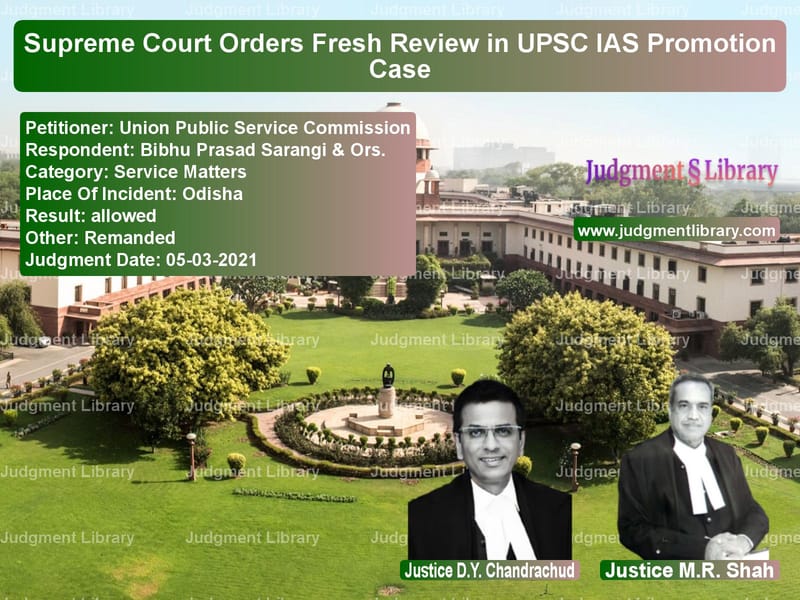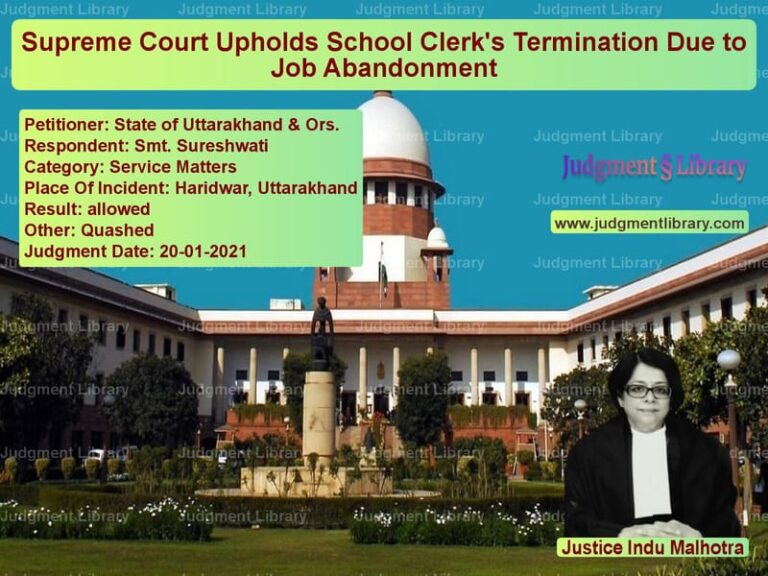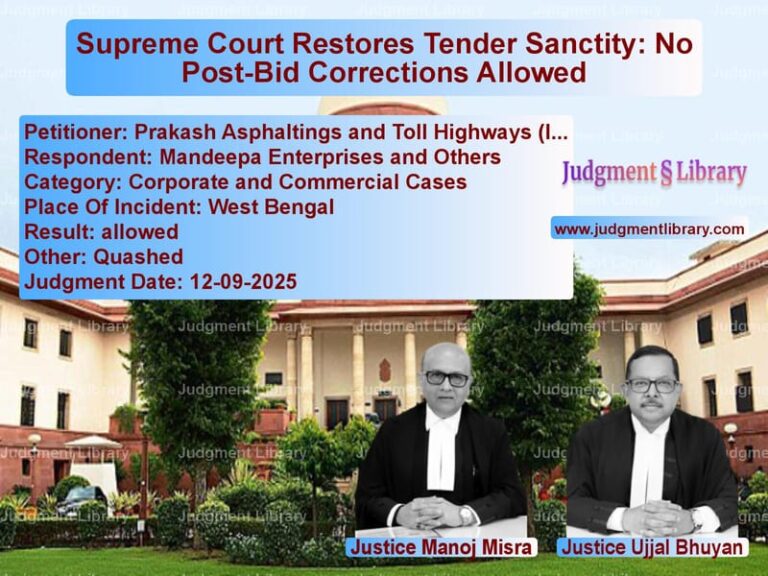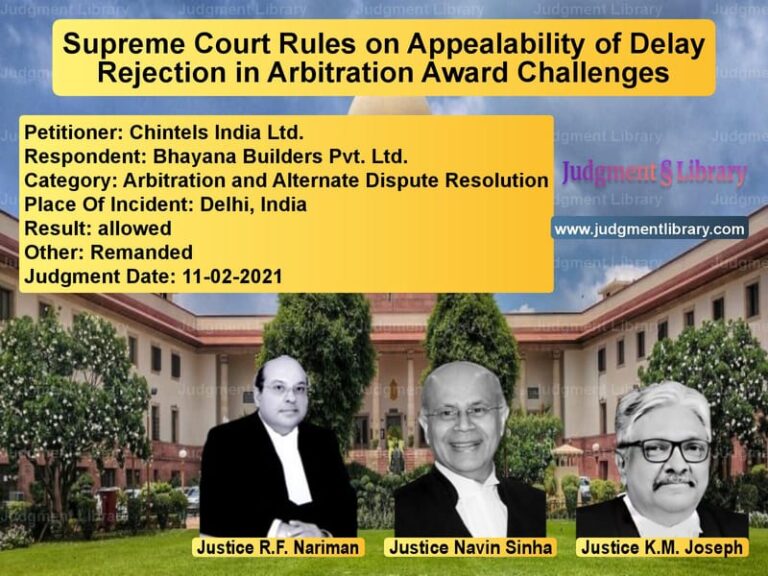Supreme Court Orders Fresh Review in UPSC IAS Promotion Case
The case of Union Public Service Commission vs. Bibhu Prasad Sarangi & Ors. revolves around a dispute concerning promotion to the Indian Administrative Service (IAS). The Supreme Court was required to determine whether a disciplinary penalty imposed in 2011 should affect the respondent’s eligibility for promotion and whether the Orissa High Court erred in upholding the ruling of the Central Administrative Tribunal (CAT).
Background of the Case
This case originates from a long-standing dispute over the promotion of officers from the Odisha Civil Services (OCS) to the IAS. The primary respondent, Bibhu Prasad Sarangi, was denied promotion due to a disciplinary penalty imposed on him in 2011. The Union Public Service Commission (UPSC) applied its standard guidelines, which disqualified candidates who had received penalties affecting their service records.
The respondent challenged this decision before the Central Administrative Tribunal, Cuttack Bench, arguing that the penalty had already been served and should not affect his future promotions. The CAT ruled in his favor, directing UPSC to reconsider his eligibility for the years 2015, 2016, and 2017.
The UPSC subsequently appealed to the Orissa High Court, which dismissed their appeal on November 21, 2019. Dissatisfied with the decision, UPSC moved the Supreme Court, arguing that the High Court’s ruling lacked independent reasoning.
Key Issues Before the Supreme Court
- Whether the Orissa High Court failed to apply independent reasoning in upholding the CAT’s decision.
- Whether the disciplinary penalty imposed in 2011 should still be considered a valid reason for denying promotion.
- Whether UPSC’s guidelines or the Department of Personnel and Training (DoPT) guidelines should govern the eligibility criteria.
Arguments by UPSC
The UPSC presented the following arguments:
- The Orissa High Court merely copied the findings of the CAT without applying its own judicial analysis.
- Under Article 320 of the Constitution, UPSC has the authority to set guidelines for promotions.
- The respondent’s disciplinary penalty in 2011 made him ineligible under UPSC’s selection criteria.
Arguments by the Respondent (Bibhu Prasad Sarangi)
The respondent countered these arguments by stating:
- The disciplinary penalty had already been served, and its impact should not extend indefinitely.
- The CAT’s ruling was well-founded and aligned with the principles of fairness in service law.
- The High Court was justified in upholding the CAT’s decision.
Supreme Court’s Analysis
1. Importance of Reasoned Judgments
The Supreme Court criticized the Orissa High Court’s ruling, stating:
- “Copying and pasting from the Tribunal’s ruling does not constitute a judicially reasoned order.”
- “Judicial orders must reflect independent analysis and not be a mere reproduction of lower court findings.”
2. Impact of the Disciplinary Penalty
The Court emphasized the need for a deeper examination of the effects of the 2011 disciplinary penalty:
- “A disciplinary penalty should not automatically disqualify an officer from promotion unless its impact is clearly stated in service rules.”
- “The continuation of penalties beyond a reasonable period undermines the principle of proportionality.”
3. Need for Clarification on UPSC vs. DoPT Guidelines
The Court observed that the applicability of UPSC’s guidelines over DoPT’s service rules needed further scrutiny:
- “UPSC’s authority under Article 320 must be balanced against DoPT’s service conditions.”
- “A uniform standard must be maintained in promotion cases to ensure transparency and fairness.”
Final Judgment
The Supreme Court set aside the Orissa High Court’s ruling and ordered a fresh review of the case. It ruled:
- The High Court must reassess the case with independent reasoning.
- The case must be heard and decided within four months due to its impact on pensionary benefits.
- The matter remains open for reconsideration based on legal and factual findings.
Implications of the Judgment
This ruling has several implications:
- It underscores the need for reasoned judicial orders in service law matters.
- It prevents arbitrary disqualifications based on past disciplinary penalties.
- It reaffirms the importance of balancing UPSC’s authority with DoPT’s service guidelines.
The Supreme Court’s decision ensures that all civil servants receive a fair and just assessment in their promotion cases.
Petitioner Name: Union Public Service Commission.Respondent Name: Bibhu Prasad Sarangi & Ors..Judgment By: Justice D.Y. Chandrachud, Justice M.R. Shah.Place Of Incident: Odisha.Judgment Date: 05-03-2021.
Don’t miss out on the full details! Download the complete judgment in PDF format below and gain valuable insights instantly!
Download Judgment: union-public-service-vs-bibhu-prasad-sarangi-supreme-court-of-india-judgment-dated-05-03-2021.pdf
Directly Download Judgment: Directly download this Judgment
See all petitions in Promotion Cases
See all petitions in Public Sector Employees
See all petitions in Employment Disputes
See all petitions in Judgment by Dhananjaya Y Chandrachud
See all petitions in Judgment by Mukeshkumar Rasikbhai Shah
See all petitions in allowed
See all petitions in Remanded
See all petitions in supreme court of India judgments March 2021
See all petitions in 2021 judgments
See all posts in Service Matters Category
See all allowed petitions in Service Matters Category
See all Dismissed petitions in Service Matters Category
See all partially allowed petitions in Service Matters Category







